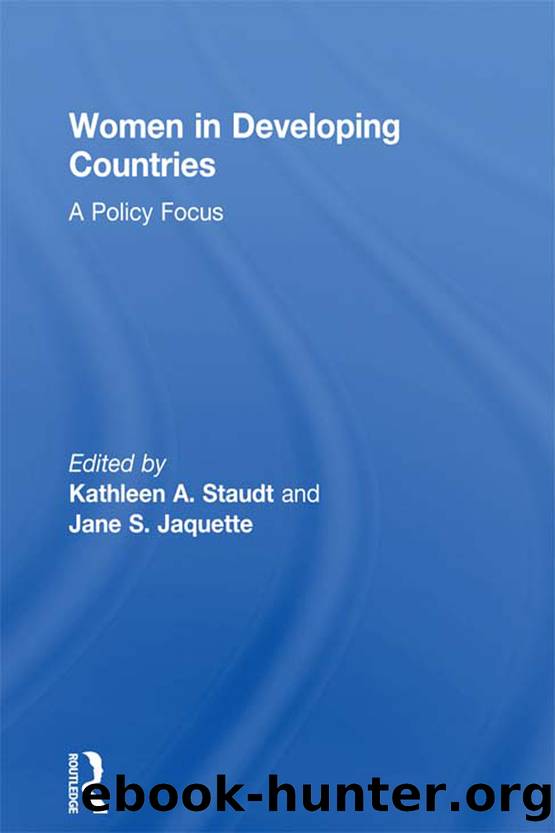Women in Developing Countries: A Policy Focus by Kathleen A. Staudt & Jane S. Jaquette

Author:Kathleen A. Staudt & Jane S. Jaquette [Staudt, Kathleen A. & Jaquette, Jane S.]
Language: eng
Format: epub
Tags: International Relations, Feminism & Feminist Theory, Social Science, Political Science, Sociology, Women's Studies, General
ISBN: 9781135818357
Google: 5pMqdghggWwC
Goodreads: 17989081
Publisher: Routledge
Published: 2013-05-13T00:00:00+00:00
* * *
Dr. Blumberg is Associate Professor of Sociology, University of California at San Diego, La Jolla, CA 92093.
Implications of Development for Women in Indonesia: Research and Policy Issues
Hanna Papanek
The role of women in the economic and social development of the less affluent nations has, in the last few years, been a matter of expressed concern to national governments and international agencies. Although women's role in development is clearly inseparable from several broad issues which are already the focus of policy concern, such as the generation and distribution of more resources for rapidly growing populations, the question of women's âintegrationâ has been framed in ways that suggest it is a âspecial interest.â Policy implementation has often required special âwomen's agenciesâ be set up, and there is a tendency to look to âwomen's projectsâ to resolve deep-seated problems and growing marginalization.
When the United Nationsâ member states discussed the issues of women in 1975, at the outset of the U.N. Decade for Women, they committed themselves to a carefully worded goal that proved to be nonetheless ambiguous: the U.N. would be committed to âthe integration of women in the development process as equal partners with men.â The goal of âintegrationâ implies that women are not involved in the productive economy. In fact women are already economically integrated into their societies in the poorer countries; they already participate in making a living for their families and are already affected in many waysâmost of them negativeâby economic growth and development policies.
Yet almost everywhere, despite a few isolated instances of women in leadership, positions, women lack power, both as individuals and as members of interest groups that influence national governments and international agencies; they are not involved in the political processes by which development resources are allocated. In South and Southeast Asia, many governments have well established âtraditionalâ procedures for recognizing and meeting some of the needs of marginalized sectors of the population, such as particular tribes or ethnic groups. In these countries it is the traditional approaches that are being brought into play to meet the needs of women, a highly complex constituency separated by class, age and ethnicity, and a group that is undergoing rapid and profound changes as modernization advances.
This paper contends that the use of these traditional administrative and political processes are inadequate to reach the goal of âintegrating women into the development process.â They may, in fact, prevent the effective integration of women because: (1) women of different classes have quite different needs and interests; and (2) established interest groups represent only a fraction of all women.
In order to move toward full integration it is necessary to increase women's access to concrete economic, social and political opportunities. This means that technical agencies concerned with resource allocation and planning must integrate data and analyses of women's roles and of the impact of past policies on women's position into their on-going work. An understanding of the fact that development policies often have a differential impact on women and men must be part of the information available in the political dialogue and bargaining process.
Download
This site does not store any files on its server. We only index and link to content provided by other sites. Please contact the content providers to delete copyright contents if any and email us, we'll remove relevant links or contents immediately.
| Anthropology | Archaeology |
| Philosophy | Politics & Government |
| Social Sciences | Sociology |
| Women's Studies |
The Rules Do Not Apply by Ariel Levy(4948)
On the Front Line with the Women Who Fight Back by Stacey Dooley(4853)
The Lonely City by Olivia Laing(4793)
Bluets by Maggie Nelson(4541)
The Confidence Code by Katty Kay(4242)
Three Women by Lisa Taddeo(3418)
Not a Diet Book by James Smith(3405)
Inferior by Angela Saini(3308)
Confessions of a Video Vixen by Karrine Steffans(3292)
A Woman Makes a Plan by Maye Musk(3235)
Pledged by Alexandra Robbins(3167)
Wild Words from Wild Women by Stephens Autumn(3133)
Nice Girls Don't Get the Corner Office by Lois P. Frankel(3034)
Brave by Rose McGowan(2816)
Women & Power by Mary Beard(2760)
Why I Am Not a Feminist by Jessa Crispin(2737)
The Clitoral Truth: The Secret World at Your Fingertips by Rebecca Chalker(2707)
The Girl in the Spider's Web: A Lisbeth Salander novel, continuing Stieg Larsson's Millennium Series by Lagercrantz David(2704)
I Who Have Never Known Men by Jacqueline Harpman(2598)
